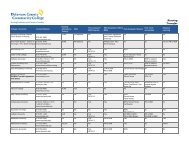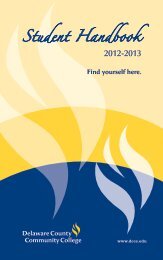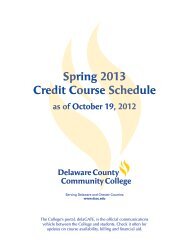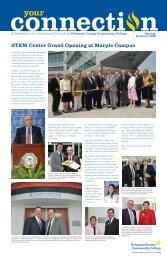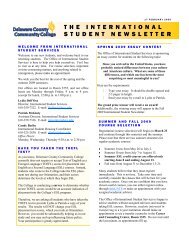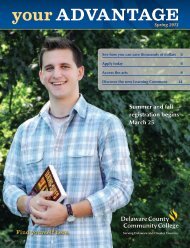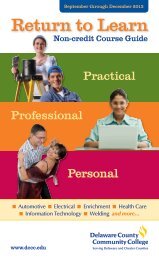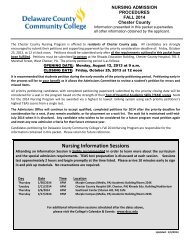2010 Catalog - Delaware County Community College
2010 Catalog - Delaware County Community College
2010 Catalog - Delaware County Community College
Create successful ePaper yourself
Turn your PDF publications into a flip-book with our unique Google optimized e-Paper software.
152 COURSE DESCRIPTIONS<br />
Upon successful completion of this course, students<br />
should be able to:<br />
• Discuss the basic concept of the legal definition of<br />
"elder".<br />
• Evaluate the legislative responses to the aging population.<br />
• Discuss the various types of health care problems that<br />
face the elderly.<br />
• Discuss employment and income issues as they affect<br />
the elderly.<br />
• Analyze the various statutes that have been enacted to<br />
assist the elderly with housing problems.<br />
• Discuss the concept of guardianship.<br />
• Identify effective estate planning.<br />
• Analyze the concept of elder abuse and apply remedies<br />
for abuse.<br />
• Discuss the agencies that provide assistance to the elderly.<br />
• Discuss relevant ethical issues.<br />
• Apply relevant modern technologies.<br />
Prereq. ENG 050 and REA 050<br />
3 Credits 3 Weekly Lecture Hours<br />
POL 100<br />
(POL) Political Science<br />
American Government<br />
A study of the government of the United Statesnational,<br />
state and local-with specific emphasis on the<br />
United States Constitution and the Constitution of the<br />
state of Pennsylvania.<br />
Upon successful completion of this course, students<br />
should be able to:<br />
• Perform the basic citizenship skills necessary to fulfill<br />
their role as an American citizen.<br />
• Describe those principles of government essential to<br />
our constitutional system.<br />
• Explain the constitutional functions of American federalism.<br />
• Describe the basic functions of government<br />
performed by the major institutions of the American<br />
national government.<br />
• Explain the major functions of state government<br />
institutions in our system.<br />
• Explain the major purpose of political parties in our<br />
system of government.<br />
3 Credits 3 Weekly Lecture Hours<br />
POL 110<br />
Introduction to Political<br />
Science<br />
This course explores the fundamental concepts in the<br />
discipline of political science and the philosophical<br />
foundation of the American system of government.<br />
Upon successful completion of this course, students<br />
should be able to:<br />
• Distinguish between political philosophy and<br />
political science.<br />
• State and explain the basic issues confronting man as a<br />
political animal.<br />
• State and define the essential concepts in the discipline<br />
of political science.<br />
• Demonstrate an understanding of the philosophical<br />
foundations of the American system of government.<br />
3 Credits 3 Weekly Lecture Hours<br />
POL 120 American National Government<br />
This course is designed to encourage, enhance and<br />
heighten the student's enlightened participation in our<br />
democratic society.<br />
Upon successful completion of this course, students<br />
should be able to:<br />
• Analyze the nature and roots of their role as an<br />
American citizen.<br />
• Enumerate those principles of government considered<br />
essential to our constitutional system.<br />
• Explain the constitutional basis of American federalism.<br />
• Understand the fundamental concepts, functions and<br />
process of politics and the institutions of our national<br />
government.<br />
3 Credits 3 Weekly Lecture Hours<br />
POL 130<br />
American State and Local<br />
Government<br />
An analytical study of the powers, process and problems<br />
of American state, county and local governments. Careful<br />
consideration of the nature of political, legislative,<br />
administrative and judicial organization at the state,<br />
county and city level will be given. Upon successful<br />
completion of the course, students should be able to: List<br />
the development of the six major historical periods in the<br />
evolution of American state and local government. Define<br />
federalism and two other major forms of governmental<br />
structure. Identify the nature, functions, structure and<br />
legal position of local government in American federalism.<br />
Trace the structure, functions and problems of the three<br />
branches of American state government with emphasis<br />
on Pennsylvania.<br />
3 Credits 3 Weekly Lecture Hours<br />
POL 140<br />
American Presidency<br />
This course is a study and analysis of the historical<br />
and political influences upon the institution of the<br />
modern American presidency.<br />
Upon successful completion of this course, students<br />
should be able to:<br />
• Explain the forces and participants involved in the<br />
dynamics of the compromise of the Constitutional<br />
Convention, which shaped the establishment of an<br />
executive branch.<br />
• Identify the constitutional model and proper role of the<br />
president in the doctrine of separation of power.<br />
• Discuss the constitutional powers of the president that<br />
overlap within the other two branches. Include some<br />
relevant and modern issues that are sources of<br />
controversy regarding their administration.<br />
• Trace the historical evolution of the president within the<br />
confines of the constitutional and non-constitutional<br />
functions of the office.<br />
• Critique the present method of nominating presidential<br />
candidates and election of the chief executive.<br />
• Identify those presidents who have made the most<br />
permanent contributions to the evolution of the office.<br />
• Explain the impact of television, campaign financing<br />
and the expectations of the American people toward<br />
the office of president.<br />
3 Credits 3 Weekly Lecture Hours<br />
POL 200<br />
World Affairs<br />
This course deals with the theory and practice of<br />
international relations.<br />
Upon successful completion of the course, students<br />
should be able to:<br />
• Identify the principle characteristics of national states.<br />
• Analyze the role of power in international politics.<br />
• Identify the major constraints a national state must<br />
deal with in the formulation and implementation of<br />
foreign policy.<br />
• Evaluate the relations between East and West in the<br />
post-World War I era.<br />
• Assess the impact of the United Nations on the relations<br />
between national states in the contemporary world.<br />
• Model appropriate strategies to acquire various<br />
methods for gathering information for the<br />
development, comprehension and practical application of<br />
said information in the deciphering of issues involved in<br />
world politics.<br />
• Relate the foundations of instruction to the practice of<br />
reading and interpreting texts at the secondary level.<br />
• Plan developmentally and culturally appropriate<br />
strategies to address individual differences among<br />
political adversaries. Enrich interdisciplinary activities<br />
by incorporating innovative technology and<br />
multimedia activities.<br />
• Teach questioning and communication skills as an<br />
integral part of cultural development.<br />
3 Credits 3 Weekly Lecture Hours<br />
POL 210<br />
Principles of Public<br />
Administration<br />
The general principles and theories of administration are<br />
analyzed and related to the management of public business.<br />
Upon successful completion of this course, students<br />
should be able to:<br />
• Evaluate the trends and philosophies of bureaucracy in<br />
the public and private sectors.<br />
• Analyze the relationship of the public administrator to<br />
the various branches and levels of government and to<br />
the general public.<br />
• Describe the roles of the public administrator in terms<br />
of goal setting, organizational and personnel<br />
procedures, and financial management.<br />
3 Credits 3 Weekly Lecture Hours<br />
PSY 120<br />
(PSY) Psychology<br />
Achievement Motivation<br />
A systematic approach that allows students to experience<br />
and learn what achievement motivation is and how to<br />
use it to increase personal effectiveness. Games,<br />
simulated life experiences and a programmed text are<br />
used to create the opportunity to learn more about<br />
themselves and to experience how the sharing of human<br />
resources allows for personal growth.<br />
Upon successful completion of this course, students<br />
should be able to:<br />
• Evaluate at least one example of each of the four action<br />
strategies presented in McClelland's theory.<br />
• Identify all of the 10 thoughts and feelings presented in<br />
McClelland's theory.<br />
• Identify their motives in at least one course simulation<br />
exercise and one future goal.<br />
• Identify some of their risk-taking patterns, personal<br />
goals, feelings, values and basic motives.<br />
Prereq. ENG 050 and REA 050<br />
3 Credits 3 Weekly Lecture Hours<br />
PSY 130<br />
Personal and Career<br />
Development<br />
This course gives students the opportunity to examine<br />
the relationship between personality traits, interests,<br />
skills and values, and appropriate life choices.<br />
Upon successful completion of this course, students<br />
should be able to:<br />
• Identify personal strengths and weaknesses.<br />
• Depict the requisite skills of the major<br />
employment clusters.<br />
• Make career decisions appropriate to the student's<br />
own current development.<br />
• Employ appropriate techniques in effecting<br />
career decisions.<br />
Coreq. ENG 050 and REA 050 or pass test<br />
3 Credits 3 Weekly Lecture Hours<br />
PSY 140<br />
General Psychology<br />
This course is a one-semester introduction to the basic<br />
principles and major theoretical approaches that are used<br />
to explain human behavior, with emphasis on understanding<br />
and application of such principles and theories<br />
as they relate to ourselves and our surroundings.<br />
DELAWARE COUNTY COMMUNITY COLLEGE




